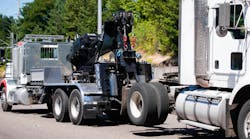It's said that sharks have to keep swimming every minute of their life or they'll die. If that's true, sharks could be very successful at running a truck fleet. There's no resting on your laurels in this industry today — your reward for successfully navigating one challenge is the opportunity to take on the next.
Take, for example, the economic battering of this last recession. For anyone hauling freight, things are slowly but steadily getting better. And listening to economists at last month's annual American Trucking Assns. conference, it sounds like for-hire carriers in particular have strong freight markets and rates ahead if they can just muddle through the next six or eight months.
But as economic Armageddon has receded on the list of things keeping fleet managers awake at night, an entirely new safety rating program has taken its place on that list. My hope is that anticipation of CSA's disruptive potential is far worse than the reality once everyone gets some real experience with it. But prudence requires fleets to be prepared to weather the transition and to have plans in place to minimize the impact on their operations.
With CSA officially taking effect next month, most fleets are well along establishing programs to address the issues it will bring. That's good because you'll need the time you've been devoting to CSA to take on a few more things headed your way.
Not to discourage you, but in the near term that list includes new regulations on hours of service that are due any day and a resurgence in the driver shortage that may make past ones look like the good old days. The impact on operations will in all likelihood be significant. Any decrease in on-duty hours will not only hurt productivity, but also bring pressure on driver earnings just as qualified drivers become a scarce resource. There's a good chance many carriers will have to completely restructure the way they compensate drivers and build their freight networks.
Also on the regulation front, emissions are far from a settled issue. Yes, truck makers have successfully transitioned to the ultra clean 2010 engine technology with few problems, though at a pretty steep price for new-truck buyers. However, that's far from the end of the road. By the time you read this, EPA is expected to have released new fuel efficiency standards for medium- and heavy-duty trucks as part of a new Federal initiative to cut greenhouse gas emissions and reduce oil consumption.
The good news here is that the first set of mandated fuel economy improvements due to take effect in 2014 should be achievable with existing technology. And it will be truck and engine manufacturers that will have to certify those improvements, not the truck user. However, will the costs to those users be completely offset by fuel savings? Only time will tell. And future phases set for 2017 and beyond will require new technology that will certainly have significant cost impacts.
Then there are the infrastructure issues that can't be ignored much longer. The overdue transportation reauthorization bill will need to address the problem of funding the delayed maintenance and expansion of our roadways. As major users of those roadways, truck operations are going to be asked to pony up, which most, I think, accept as fair. The question is, how will you be asked to pay? Will it be higher fuel taxes, or some type of tolling system? And how will you be sure that additional money really goes to rebuilding infrastructure?
Just writing out this list is tiring, but there's no time to stop and rest. It looks like you'll just have to keep swimming with the sharks.


